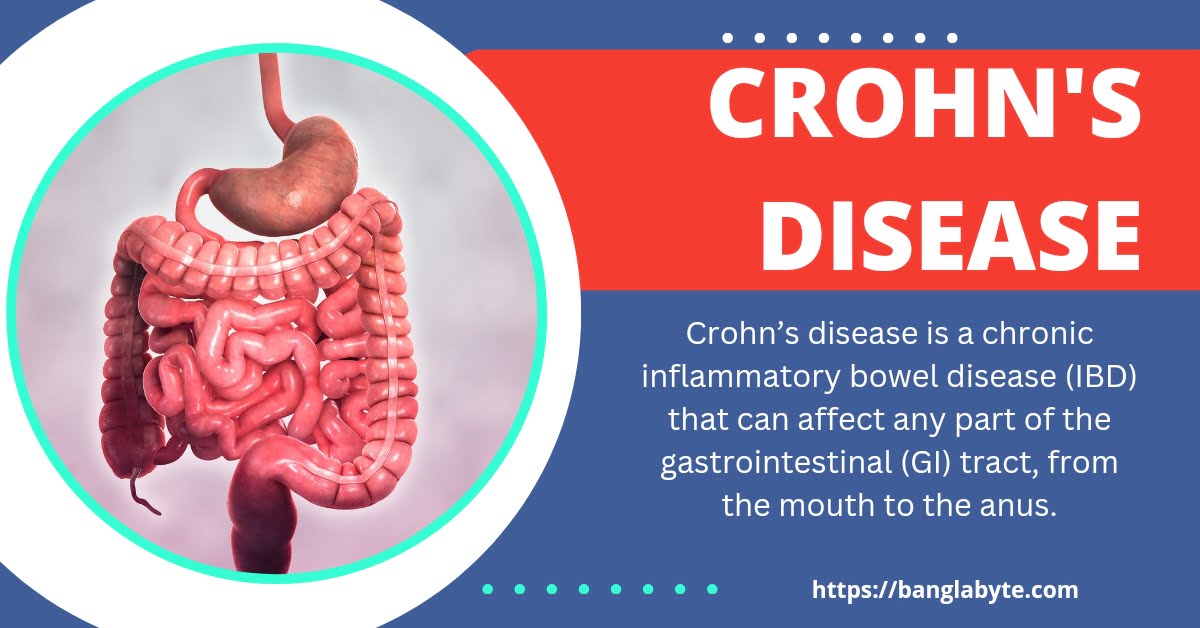
Crohn’s disease is a chronic inflammatory bowel disease (IBD) that can affect any part of the gastrointestinal (GI) tract, from the mouth to the anus. It is characterized by persistent inflammation, which can result in a wide array of symptoms and complications, severely impacting daily life. If you or a loved one has been diagnosed with Crohn’s disease, gaining a comprehensive understanding of its symptoms, causes, and available treatments is essential to managing this condition effectively.
What is Crohn’s Disease?
Crohn’s disease is a type of autoimmune disorder where the immune system mistakenly attacks the body’s own tissues, particularly within the digestive tract. This leads to chronic inflammation, which can cause symptoms such as abdominal pain, diarrhea, fatigue, and weight loss. As a long-term condition, Crohn’s disease often fluctuates between periods of remission and flare-ups. It falls under the broader category of inflammatory bowel disease (IBD), which also includes ulcerative colitis.
Who is Affected by Crohn’s Disease?
Although Crohn’s disease can affect anyone, it is most commonly diagnosed in individuals aged 15 to 35. Both men and women are equally susceptible to developing the condition, though certain factors such as ethnicity and geographic location may influence its prevalence. Family history plays a significant role; individuals with a genetic predisposition to Crohn’s disease are more likely to develop it.
Symptoms of Crohn’s Disease
The symptoms of Crohn’s disease vary depending on which part of the digestive tract is affected and the severity of the inflammation. Below are some of the most common symptoms experienced by individuals with Crohn’s:
- Abdominal Pain and Cramping: Typically felt in the lower right abdomen, but pain can occur anywhere along the GI tract.
- Chronic Diarrhea: Diarrhea, often persistent and sometimes bloody, is a hallmark symptom of Crohn’s disease.
- Fatigue: The constant inflammation and immune system activity can result in overwhelming fatigue.
- Weight Loss: Inadequate nutrient absorption due to digestive inflammation can lead to unintended weight loss.
- Fever: Mild fevers may occur during flare-ups due to increased inflammation.
- Mouth Sores: Some individuals develop painful ulcers in the mouth, particularly during active disease phases.
- Loss of Appetite: Nausea, pain, or discomfort following meals may lead to reduced food intake.
Complications of Crohn’s Disease
When left untreated or poorly managed, Crohn’s disease can lead to various complications, some of which can be life-threatening:
- Intestinal Obstruction: Chronic inflammation can cause narrowing and scarring of the intestines, leading to bowel obstructions.
- Fistulas: These are abnormal connections between different parts of the bowel or between the bowel and other organs, such as the bladder or skin, often resulting in infections.
- Nutritional Deficiencies: Malabsorption of key nutrients can cause deficiencies in iron, calcium, and B12, among other essential vitamins and minerals.
- Increased Risk of Colon Cancer: Long-standing inflammation, especially in the colon, raises the risk of developing colon cancer.
- Abscesses: Pockets of pus may form due to infection, causing severe pain and requiring medical intervention.
What Causes Crohn’s Disease?
The exact cause of Crohn’s disease remains unknown, but several contributing factors are thought to play a role:
- Genetics: Family history is a known risk factor, with research identifying certain genes that may increase susceptibility to Crohn’s.
- Immune System Dysfunction: The immune system in people with Crohn’s mistakenly attacks the GI tract, leading to inflammation. This immune response might be triggered by bacteria or other pathogens, but it persists abnormally.
- Environmental Factors: Smoking, pollution, stress, and dietary habits have been linked to the development and exacerbation of Crohn’s. People in urban or industrialized regions are more likely to be affected, hinting at a potential environmental link.
- Gut Microbiota: Imbalances in the gut microbiome, which includes bacteria and other microorganisms living in the digestive tract, are believed to contribute to the development of Crohn’s.
Diagnosis of Crohn’s Disease
Diagnosing Crohn’s disease can be challenging because its symptoms often overlap with other digestive conditions, such as irritable bowel syndrome (IBS) or ulcerative colitis. Doctors typically use several tests to make a diagnosis:
- Blood Tests: These can detect signs of inflammation and anemia, which may indicate intestinal bleeding.
- Stool Tests: Analyzing stool samples helps identify infection and blood presence, offering insight into digestive health.
- Endoscopy and Colonoscopy: These procedures use a small camera to examine the inside of the digestive tract. Tissue samples (biopsies) may be taken to confirm inflammation and other abnormalities.
- Imaging Tests: MRI, CT scans, and X-rays can help identify the extent of inflammation, blockages, or damage in the digestive system.
- Capsule Endoscopy: Patients swallow a small camera encapsulated in a pill, which captures images of the digestive tract as it passes through, identifying areas of inflammation not visible in traditional methods.
Treatment Options for Crohn’s Disease
There is no cure for Crohn’s disease, but treatments are aimed at reducing inflammation, relieving symptoms, and preventing complications. Treatment plans are highly individualized based on the location and severity of the disease.
1. Medications:
Anti-inflammatory drugs: Corticosteroids and aminosalicylates (5-ASAs) are commonly prescribed to reduce inflammation during flare-ups.
Immunosuppressants: Drugs like azathioprine and methotrexate suppress the immune system to control inflammation.
Biologics: Biologics such as infliximab and adalimumab target specific parts of the immune system to reduce inflammation.
Antibiotics: Prescribed to treat infections that may arise from fistulas or abscesses.
2. Diet and Nutrition:
Nutritional Therapy: Some patients may benefit from a special liquid diet or supplements, especially during flare-ups.
Identifying Trigger Foods: Keeping a food diary can help identify and avoid foods that trigger flare-ups, such as high-fiber, fatty, or dairy foods.
3. Lifestyle Modifications:
Quitting Smoking: Smoking exacerbates Crohn’s symptoms and increases the risk of flare-ups.
Stress Management: Practices such as yoga, mindfulness, and relaxation techniques can help reduce stress and improve overall well-being.
4. Surgery:
Surgery may be required to remove damaged sections of the intestine, particularly if complications like blockages, fistulas, or severe bleeding occur. However, surgery does not cure Crohn’s disease, and symptoms may return over time.
Living with Crohn’s Disease
Managing Crohn’s disease requires a long-term approach involving medications, dietary changes, and emotional support. Regular follow-ups with healthcare providers help ensure the condition is monitored and treated appropriately. Joining a support group can provide emotional support, helping individuals cope with the challenges of living with a chronic condition.
Is Crohn’s Disease Genetic?
Yes, **Crohn’s disease has a genetic component**. Studies show that individuals with a family history of Crohn’s or other inflammatory bowel diseases (IBD), such as ulcerative colitis, are at higher risk of developing the condition. Over 200 genes associated with Crohn’s disease have been identified, suggesting a genetic predisposition.
However, genetics alone does not account for the onset of Crohn’s. The condition likely develops due to a combination of genetics, environmental factors, and immune system dysfunction. While a genetic predisposition increases the risk, lifestyle, diet, smoking, and the gut microbiome also play significant roles in triggering or worsening the disease.
In summary, genetics can increase the likelihood of developing Crohn’s, but environmental factors are also crucial, and having a genetic risk does not guarantee the development of the disease.
How Serious is Crohn’s Disease?
Crohn’s disease is a **serious, chronic inflammatory bowel disease (IBD)** that can significantly impact a person’s quality of life. Its severity ranges from mild to debilitating, affecting different parts of the gastrointestinal tract and causing a wide array of symptoms and complications.
Key factors illustrating the seriousness of Crohn’s disease include:
1. Symptoms and Daily Life Impact
Chronic symptoms: Persistent abdominal pain, diarrhea, fatigue, and weight loss are common and fluctuate in severity, often disrupting daily routines.
Daily life disruption: Frequent bathroom trips, fatigue, and pain can interfere with work, school, and social activities, making life unpredictable for many.
2. Complications
Crohn’s can lead to severe complications if not well-managed:
Intestinal obstructions: Inflammation and scarring may cause blockages, potentially requiring surgery.
Fistulas and abscesses: These abnormal connections or pus collections between the intestines and other organs can lead to serious infections.
Malnutrition: Poor nutrient absorption can result in vitamin and mineral deficiencies.
Increased cancer risk: Long-standing Crohn’s, especially in the colon, raises the risk of colon cancer.
Other complications: Crohn’s can affect the joints, skin, eyes, and liver.
3. Treatment Challenges
Lifelong condition: There is no cure for Crohn’s. Treatment focuses on managing symptoms and preventing complications, but remission and flare-ups vary from person to person.
Medications: Treatments include anti-inflammatories, immune suppressants, and biologics, but side effects and treatment effectiveness vary.
Surgery: Many individuals with Crohn’s may require surgery to remove damaged intestine sections, but this does not cure the disease, and symptoms often return.
4. Quality of Life
Crohn’s can lead to anxiety, depression, and social isolation due to unpredictable flare-ups, dietary restrictions, pain, and fatigue.
5. Mortality Risk
Although **Crohn’s disease is rarely fatal**, severe complications like infections, sepsis, or untreated malnutrition can be life-threatening. Proper management significantly lowers mortality risks.
Crohn’s Disease Symptoms in Females
**Crohn’s disease symptoms in females** are generally similar to those in males but can be influenced by hormonal changes related to menstruation, pregnancy, and menopause. Below are common symptoms, along with some female-specific considerations:
Common Crohn’s Disease Symptoms in Females:
- Abdominal Pain and Cramping: Pain is often in the lower right abdomen but can occur throughout the digestive tract.
- Chronic Diarrhea: Frequent diarrhea, sometimes with blood or mucus, is a hallmark symptom.
- Fatigue: Ongoing inflammation and nutrient malabsorption lead to chronic fatigue.
- Weight Loss: Reduced appetite and poor nutrient absorption can result in unintended weight loss.
- Mouth Sores: Some women develop painful mouth ulcers.
- Fever: Low-grade fevers may accompany flare-ups.
- Joint Pain: Arthritis-like symptoms, particularly joint pain and swelling, are common in women.
Female-Specific Considerations and Symptoms:
1. Menstrual Cycle Fluctuations:
- Symptoms such as diarrhea and abdominal pain may worsen around menstruation due to hormonal changes.
- Severe Crohn’s or significant weight loss can cause irregular periods or missed cycles (amenorrhea).
2. Pelvic Pain:
Inflammation, particularly in the lower intestines, can cause pelvic pain, which is sometimes mistaken for gynecological issues.
3. Urinary Symptoms:
Women may experience urinary discomfort or increased frequency due to inflammation or fistulas near the bladder.
4. Fertility:
While Crohn’s generally does not affect fertility, active disease and certain medications can impact reproductive health. Women planning to conceive should consult their doctors to manage treatment safely.
5. Pregnancy:
Symptoms may improve, worsen, or remain stable during pregnancy. Flare-ups during pregnancy increase the risk of preterm birth or low birth weight, making close monitoring essential.
6. Menopause:
Hormonal changes during perimenopause and menopause can affect Crohn’s symptoms, either worsening or improving the condition.
Mental and Emotional Health
Hormonal changes, along with the stress of managing a chronic illness, can lead to anxiety, depression, and social isolation, which are important aspects to address in women with Crohn’s disease.
Conclusion
Crohn’s disease is a complex and lifelong condition that affects each person differently. Understanding its symptoms, causes, and treatment options can empower patients to take an active role in managing their health. With the right combination of medical treatment, lifestyle modifications, and support, many people with Crohn’s disease can lead full, productive lives despite the challenges posed by the disease. If you suspect you may have Crohn’s disease, seeking timely medical advice is the key to effective management.



